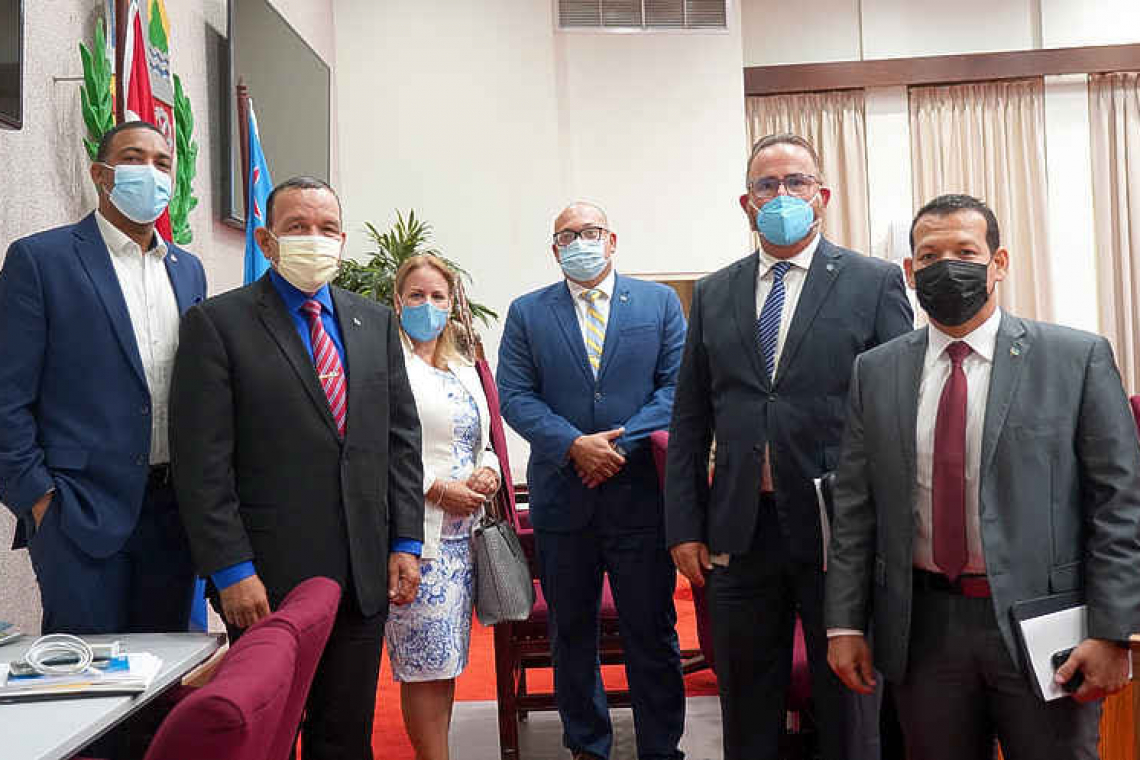Caretaker Prime Minister Evelyn Wever-Croes (third from left) and Minister Glenbert Croes (second from right) with Members of the Aruba Parliament. (Aruba government photo)
ORANJESTAD/THE HAGUE--The Caribbean Reform and Development Body COHO and the negotiations with the Netherlands were recently discussed in the Aruba Parliament. At that meeting, caretaker Prime Minister Evelyn Wever-Croes explained why it is so important that Aruba received and continues to receive Dutch financial assistance.
The last 13 months of intense negotiations with the Netherlands have not been easy, but they have proved worth their while, said Wever-Croes. “Our strategy to remain firm at the negotiation table and not always sign, has secured great things for Aruba,” she told Parliament last week Thursday. “We maintained our rights, our autonomy. This is a period that we are fully dependent on the Netherlands, because every month we need their financial support.”
In the 13 months of negotiations, the draft Kingdom Law to implement the COHO has changed from describing an entity with more power than the local government and Parliament, to an entity that supervises and assists instead of dictating. “For us it is important that the autonomy of our country is safeguarded and that our Parliament is respected.”
The COHO will be secured in a kingdom law that will count for the three Dutch Caribbean countries, but Aruba also has an additional law that will be implemented, and which has been negotiated: the Kingdom Law on Financial Supervision for Aruba RAFT.
The RAFT will replace the current national ordinance that regulates financial supervision of Aruba’s public finances. The Dutch government insisted on this becoming a kingdom law because it is lending Aruba more than one billion Aruban florins in liquidity support during the COVID-19 pandemic. According to the prime minister, the COHO and RAFT as now agreed upon will bring back tranquillity and stability, especially financially.
From April 2020 up to the third quarter of 2021, Aruba received five tranches of liquidity support in the form of no-interest loans for a total amount of Afl. 903 million. The need for liquidity support for the fourth quarter has been calculated at about Afl. 180 million. The same amount is expected to be needed for the first quarter of 2022.
The liquidity support from The Hague has been needed not only to sustain the governmental apparatus and the obligations it has, but also to cover medical expenses, education and security during the pandemic, at a time when practically all government revenues crashed as a result of the halt in tourism.
In addition, the Aruba government had to support the private sector and all those who lost their jobs. “Government had to step in. This was never a responsibility of government before,” said Wever-Croes.
The wage subsidy was introduced which, up to last month, secured the jobs of close to 7,500 workers for an amount of Afl. 8 million per month. In total, government paid Afl. 128 million in wage subsidies since the start of the pandemic.
Unfortunately, many people lost their jobs. In June, close to 4,000 persons received financial support. Since the start of the pandemic, government has made Afl. 65 million available to unemployed persons.
“Government has been making multiple efforts to keep its head above water while assisting the people during the worst crisis our country has seen. Thanks to the financial aid, our vision and strategy, we are recovering,” said Wever-Croes.
“We had anticipated recovering 76 per cent of our tourism by the end of this year. However, we are now in a new wave of COVID-19 infections, and we are starting to see cancellations. That is why it is of utmost importance to get vaccinated, so tourism can recuperate and our economy can grow,” she said.







